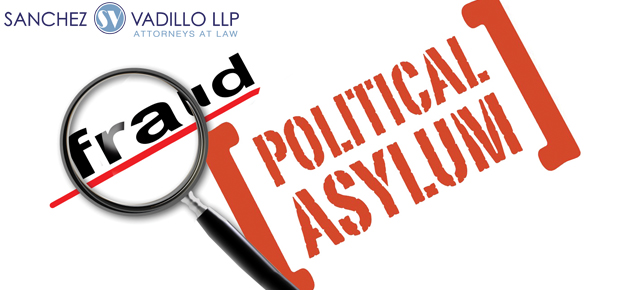Fraud in Political Asylum

Elizabeth Méndez Salom, Esq.
Email: emendez@svlawus.com
Recently, a District Judge of the State of Arizona sentenced Ali Vahdani Pour, an Iranian citizen who would have lied in an application for political asylum, to 137 days in prison. Mr. Pour, 28 years old, admitted to falsely denying being part of the Iranian army and that the Italian government had previously granted him refugee status.
The investigation carried out in this case was jointly conducted by the US Immigration and Customs Enforcement Services (ICE), the US Citizenship and Immigration Services (USCIS) and the Federal Bureau of Investigation (FBI). It is important to note that the above mentioned federal agencies are responsible for investigating the background of persons requesting political asylum, an investigation that is more meticulously every day.
Asylum seekers should be aware of the consequences to which they would face should their asylum claim be found to be frivolous and/or should their asylum claim to be found to contain intentional false claims. If it is determined that the applicant lied, then he or she will be permanently ineligible for any immigration benefits provided in the Immigration Laws in the United States. Also, if the applicant intentionally falsifies or conceals a material fact for the petition or presents false documents, he/she may be subject to criminal charges for fraud and subject to a deportation procedure.
As stated by the USCIS Los Angeles Asylum Director, David Radel, in relation to the Pour’s case, “Making false statements to support[a] claim for asylum in the U.S. will not be tolerated.”[2]
The person requesting political asylum must establish, through credible testimony and forceful evidence that he has been or will be persecuted for reasons of race, religion, nationality, membership in a particular social group or for his political position. The asylum seeker must have been deprived of a fundamental right, such as life, liberty, personal integrity, among others, or run an imminent risk of being so, based on the aforementioned reasons.
The best advice is to always research and look for competent legal counsel in order to make informed decisions about any petition to be submitted to the Citizenship and Immigration Services or to the Department of State. The consequences of making decisions carelessly can be very serious, and have severe consequences including criminal charges, such as in Pour’s case.
[1]https://www.uscis.gov/news/news-releases/uscis-helps-get-conviction-asylum-fraud
[2]https://www.uscis.gov/news/news-releases/uscis-helps-get-conviction-asylum-fraud

Fraude en Asilo Político
Elizabeth Méndez Salom, Esq.
Email: emendez@svlawus.com
www.svlawus.com
Recientemente, un Juez de Distrito del Estado de Arizona, sentenció a 137 días en prisión a Ali Vahdani Pour, un ciudadano iraní quién habría mentido en una solicitud de asilo político. Pour, de 28 años, admitió haber negado falsamente que hubiera formado parte del ejército iraní y que el gobierno Italiano le hubiera otorgado previamente el estatus de refugiado.
La investigación llevada a cabo en este caso fue realizada en conjunto por el Servicio de Control de Inmigración y Aduana (ICE), el Servicio de Ciudadanía e Inmigración (USCIS) y la Oficina Federal de Investigaciones (FBI). Es importante hacer notar que las agencias federales correspondientes se encargan de investigar cada día con más exhaustividad los antecedentes de las personas que solicitan asilo político.
Los solicitantes de asilo deben estar conscientes de las consecuencias a las que estarían expuestos si se determina que su petición de asilo es frívola y que el sujeto a realizado afirmaciones falsas intencionalmente. Si se determina que el solicitante mintió, entonces él o ella serán inelegibles permanentemente para cualquier beneficio inmigratorio previsto en las Leyes de Inmigración en los Estados Unidos. Asimismo, si el solicitante intencionalmente falsifica o esconde un hecho material para la petición o presenta documentos falsos podrá estar sujeto a cargos penales por fraude y ser objeto de un procedimiento de deportación.
El Director de la Division de Asilos Políticos de la Oficina del Servicio de Ciudadanía e Inmigración (USCIS) en Los Angeles, David Radel, con relación al caso Pourafirmó que “Realizar afirmaciones falsas para fundamentar [una]solicitud de asilo en los Estados Unidos no será tolerado.”[1]
La persona que pide asilo político debe establecer, a través de un testimonio creíble y de evidencia contundente, que ha sido o será perseguido por razones de raza, religión, nacionalidad, membresía en un grupo social en particular o por su posición política. El solicitante de asilo debe haber sido privado de un derecho fundamental, tales como la vida, la libertad, la integridad personal, entre otros, o correr un riesgo inminente de serlo, basado en las razones antes mencionadas.
El mejor consejo es siempre investigar y contar con la asesoría legal adecuada que permita tomar decisiones informadas sobre cualquier petición a ser sometida ante el Servicio de Ciudadanía e Inmigración o ante el Departamento de Estado. Las consecuencias de tomar decisiones a la ligera, pueden ser muy serias, como en el caso de Pour.

